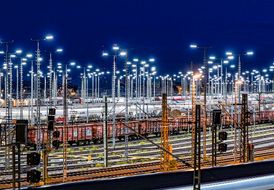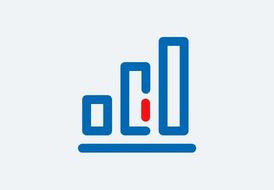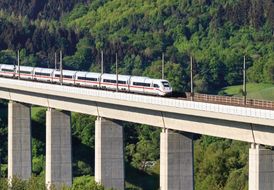Key economic performance indicators
- ROCE and debt coverage improved, but continued to be negatively impacted by the effects of Covid-19.
| VALUE MANAGEMENT TARGETS / % | DB | Passenger | Freight trans- | Infra- | Integrated | |
ROCE | ≥6.5 | ≥9.0 | ≥11.0 | 5.5 | ≥6.0 | |
Debt coverage | ≥20 | ≥50 | ≥50 | ≥20 | ≥20 | |
At DB Group, profitability is a material requirement for financing capital expenditures in our core business, further developing our businesses and seizing opportunities for future growth. Entrepreneurial management is crucial for improving profitability.
In the context of our value management, we intend to manage DB Groupʼs enterprise value over the long term such that we can finance capital expenditure in our core business. DB Group’s financial leadership and management – and therefore also monitoring the success of our economic targets – is carried out via a value management system based on key performance indicators. The results are an important factor for our strategic approach, our capital expenditure decisions and employee and management remuneration.
Profitability as an overarching target in value management aims to ensure a long-term reasonable rate of return over several economic cycles. On the basis of market values, we calculate the annual cost of capital as a weighted average from risk-adequate market returns on equity and debt capital. The actual yield, the return on capital employed (ROCE) is calculated as the ratio of operating profit before interest and taxes (EBIT adjusted) to capital employed. The ROCE target is set higher than the cost of capital. The long-term objective is to achieve an ROCE whose multi-year average reaches the target value, ensuring that the cost of capital is covered. This ROCE target corresponds to the minimum required rate of return (MRR). The different business characteristics result in different target values for our activities in passenger transport, in logistics and in rail freight transport as well as in infrastructure. The cost of capital and thus the expected returns from the infrastructure business units are lower than in passenger transport, logistics and rail freight transport owing to our projection of continuing lower profit volatility. The derived target value of the Integrated Rail System is based on the value-weighted return expectations for the allocated business units. The operating business is always controlled before taxes and, accordingly, the reporting of key figures is based mainly on pre-tax figures.
Financial stability is an essential component for sustainable economic activity. For DB Group as an asset-intensive company, it is essential that we have access to the capital market at all times under favorable conditions. A major objective is therefore to achieve adequate key debt ratios. Our key figure for managing indebtedness is debt coverage. The target value is derived from key credit rating figures and annual benchmarking with companies with a strong creditworthiness.



